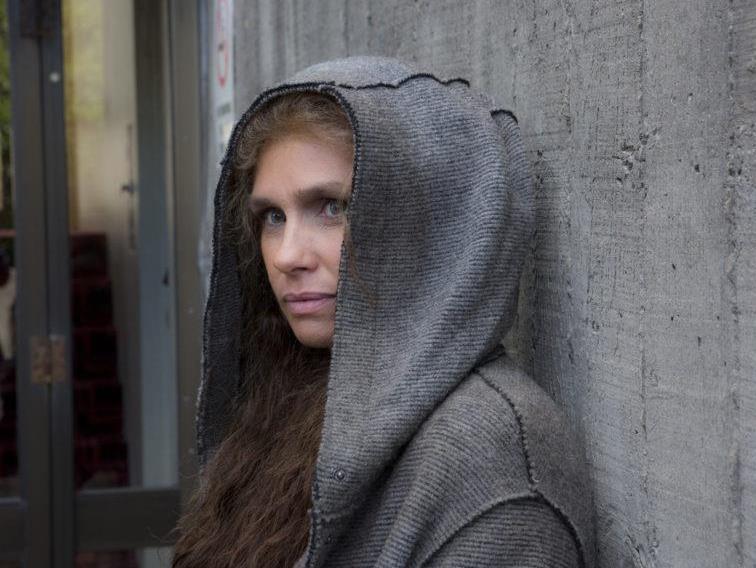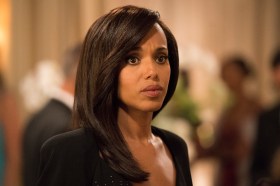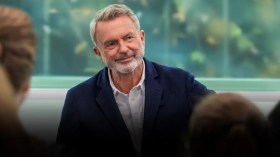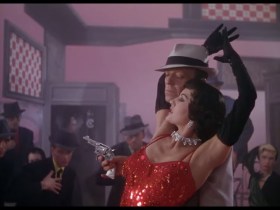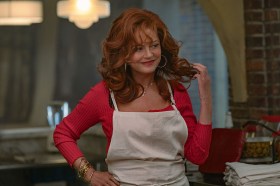Image: Cleverman
Australian writers have been crucial to our national imagination for a long time, and are now joined by a generation of screenwriters who are trying to bend the landscape of production in a new direction. They are writing fantasy and science fiction and banging on doors both locally and in the US.
Catherine S.McMullen, for instance, won the 2017 John Hinde Prize for Excellence in Science Fiction writing awarded by the Australian Writers’ Guild. Hinde was a beloved film reviewer and broadcaster who died in July 2006 at the age of 92. He started in the ABC as a war correspondent and stayed for over fifty years. The bequest was nothing short of inspired.
‘It is a really exciting time to be writing SF in Australia’, said McMullen. ‘Compared to previous years, there is SF on the screen – Glitch, The Kettering Incident and Clever Man. Horror and SF films are doing really well as well. They are selling overseas – Babadook is one of our most successful exports of recent years and is solidly genre.
‘We have a really, really fantastic science fiction literary tradition. It is not true that we can’t imagine different worlds. I think Australian SF writers do amazing stuff.
‘We have a strong ecological scene which is a strand of SF which specialises in dystopian worlds, or worlds where the environment has gone wrong.’
Fantasy and SF writing is a subculture, sustained by fanzines, small presses, bookshops, conferences, conventions, and the net. It is organic and half-hidden, unknown to most Australians. It doesn’t need huge dollops of money to survive, and can spread widely without much capital. It is closely connected to its audiences. The very scale encourages discipline. According to McMullen, ‘Its partly because we have less eyeballs and less room for minority productions.’
Do we reject the genre?
In mainstream film and TV, there is a persistent idea that Australians don’t do science fiction and fantasy. Instead we plod happily along with melodrama, social realism, history, biopics and true crime.
And yet, the impression doesn’t fit the facts. Screen fantasy and sci-fi are close to our most successful genre and our greatest exports. George Miller dominates the space, with the Mad Max films, Happy Feet and the Babe sagas. Peter Weir made an early trilogy in The Cars that Ate Paris, The Last Wave and Picnic at Hanging Rock.
There was a monster heap of fantasy/sci-fi films in the 1980’s, fuelled by the federal government’s naive idea that the 10ba tax deal would not be colonised by films like Chain Reaction, Turkey Shoot, Patrick, Dead End Drive In and Sky Pirates.
Rolf de Heer made Incident at Raven’s Gate, while The Time Guardian cost serious money. Alex Proyas started with Spirits Of The Air, Gremlins Of The Clouds. Film Ink has a canonical list.
The very edges of the genre were kept alive by credit card and mates-rate pictures, often made by craftspeople trained on overseas films in special effects, stunts and controlled explosions. There was a trickle through the NIneties with Body Melt from Philip Brophy and his cowriter Rod Bishop while the Spierigs started with The Undead in 2001, to cite some memorable moments.
Going into hiding
However, low budget science fiction went underground from the early Nineties – a subcultural cataclysm which the larger society did not notice. Many would say it was driven out by the agencies.
The answer is more complex. Ambitious filmmakers turns away from genre to the quirky social realism of films like Proof, Priscilla, Queen of the Desert, Strictly Ballroom and Muriel’s Wedding. The Howard government cut funding streams that supported arthouse films. The American tentpole superhero and space operas derived from Star Wars and Superman taught audiences that SF and fantasy was about scale rather than ideas.
Brian Rosen, CEO of the former Australian Film Finance Corporation from 2003 to 2008, maintains that ‘Science fiction films were few and far between. I can’t remember any. Once the agencies tended not to develop that sort of film, but filmmakers didn’t want to make them either. Everyone wanted to make serious films – dramas or comedies.
‘Besides, science fiction was expensive so it didn’t fit a low budget model.’
Imaginative, world-building filmmaking found the ultimate Australian hidey-hole. It flourished quietly in children’s film and TV, both in live action and animation, floating to the surface occasionally with high budget animation like Guardians of Ga’Hool and the stop motion indy Mary and Max and the ambitious Tomorrow When the War Began.
But it is worth saying that audiences in Australia for fantasy, science fiction and animation were huge, so huge that most of the money that Hollywood made from our economy was probably from what-if? films. We love them and we prove it every week.
Revolt of the writers
Meanwhile, the screenwriters were grinding their teeth. Catherine S. McMullen’s mother has just retired after a professional life as librarian, working her way up as a manager. Her father worked in the computer department of the Bureau of Meteorology, but he came home from work each night to a second career.
Sean McMullen is a science fiction writer, with seventeen books, over seventy stories and a solid international reputation. Now 69, he is finally able to write full time.
So his daughter swam in a sea of ideas. ‘I grew up loving books and reading and moved to TV and film as my first love. So many of those influences shaped what I want to do on screen.’
‘I always felt I would have to go to America to make my career. My career goal was the US.’ Like many other Australian writers, McMullen trod the Hollywood sidewalks and took meetings. She showed her original scripts to agents and producers, well aware that these projects are really a form of self-advertisement.
‘The spec scripts are mostly as samples’, she said. ‘Very very occasionally producers are interested in the story, but they function mostly as a sample. They wanted to find out if they had any projects for me, or just to meet me. But I was lucky enough to have a few of them get some interest.’
The international competition arena has been a valuable stepping stone. As the Australian Writers’ Guild happily acknowledged, ‘In 2016 she was a semifinalist in the Academy Nicholl Screenwriting Awards, a finalist in the PAGE International Screenwriting Awards, and was winner of the prestigious Sir Peter Ustinov Television Scriptwriting Award presented by the International Emmys Foundation for her script Living Metal.’
Emerging into the light
While the writers were striking out for the West Coast, Australians started to make low(er) budget SF and fantasy films around 2010. Gizmodo has an excellent list – Exit, These Final Hours, The Infinite Man, Predestination, The Rover, Arrowhead, The Death and Life of Otto Bloom, Otherlife, Gateway Alpha, The Osiris Child: Science Fiction Volume One…. and there are more.
As the screen sector globalised and individual writers gained international experience, the AWG became much more entrepaneurial. It set up the Pathways Program to develop ways in which producers could reach out for original scripts, and advertised the work of the most prominent writers in the Pathways Prime program. Last November, the program went online in the Pathways Showcase. No less than 29 of the 75 projects currently available are what-if films with imaginary worlds. Again, dystopia features a lot.
Catherine S. McMullen’s script, Awake, is about a society in which the richest one percent are privileged to live without sleep, on an endless cycle of pleasure and consumption. The Guild also gave it Scripted Ink investment to include her and the project in a collective writers’ room.
The AWG steps in
The John Hinde award was a quixotic attempt to honour the most neglected group of genres in Australian scriptwriting. The wider Pathways and Scripted Ink programs are about the welfare of writers, and their role in the sector. It sets up new markets, and helps writers to develop finished scripts from their own imaginations as masters of their minds rather than servants of external desire.
But the support for fantasy and science fiction is valuable for a reason which is specific to the form. It has tended to be driven either by the US market and its very specific cultural demands (undies in phone booths! human spiders! save the galaxy!) or by energetic directors who come from design and VFX, or who want to make a calling card.
Unfortunately, their ideas could be derivative. Said McMullen, ‘It is so important to know the genre. It is not a closed door, but if I decided to write a thriller, I would have to respect a long tradition and really do my research. There is a really long tradition of shows that deal with it.’
You have to know the form. And read the books and comics. And maybe even draw the comics.
————
Richard Watts, the performing arts editor of ArtsHub, put a message on his Facebook page asking for examples of good contemporary Australian fantasy and SF writing. We were delighted by the response and the care in the lists.
This is what they came up with.
Rose Michael – The Art of Navigation
Jane Rawson – From the Wreck
James Bradley – Clade
Emilie Collyer – anything
Claire G Coleman – Terra Nullius
Marlee Jane Ward – Welcome to Orphancorp and Psynode
Cat Sparks – Lotus Blue
Greg Egan – anything.
Kim Westwood – The Courier’s New Bicycle
Briohny Doyle – The Island Will Sink
Charlotte Wood – The Natural Way of Things
Steven Amsterdam – Things We Didn’t See Coming
Margo Lanagan – everything
Sean Williams – heaps
Sean McMullen – lots
Marianne de Pierres – The Sentients of Orion
Kaaron Warren – scarey stuff
Adam Browne plus film – Pyrotechnicon
Terry Dowling – Wormwood
Dreaming Down Under anthologies one and two
Andrew Macrae – Trucksong
Sally Abbott – Closing Down
Krissy Kneen – Uncertain Grace
Dirk Flinthart – lots
Amie Kaufman and Jay Kristoff trilogy The Illuminae Files.
